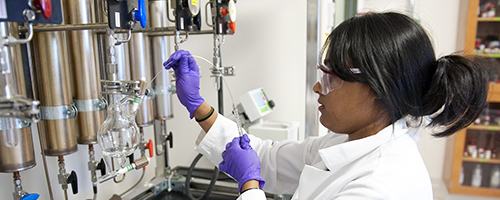Document Type
Article
Publication Date
1-10-2018
Publication Title
Chemical Science
Abstract
The challenge of site-selectivity must be overcome in many chemical research contexts, including selective functionalization in complex natural products and labeling of one biomolecule in a living system. Synthetic catalysts incorporating molecular recognition domains can mimic naturally-occurring enzymes to direct a chemical reaction to a particular instance of a functional group. We propose that DNA-conjugated small molecule catalysts (DCats), prepared by tethering a small molecule catalyst to a DNA aptamer, are a promising class of reagents for site-selective transformations. Specifically, a DNA-imidazole conjugate able to increase the rate of ester hydrolysis in a target ester by >100-fold compared with equimolar untethered imidazole was developed. Other esters are unaffected. Furthermore, DCat-catalyzed hydrolysis follows enzyme-like kinetics and a stimuli-responsive variant of the DCat enables programmable “turn on” of the desired reaction.
Issue
9
First Page
2105
Last Page
2112
DOI
10.1039/c7sc04554a
Creative Commons License

This work is licensed under a Creative Commons Attribution 4.0 International License.
Recommended Citation
Flanagan, Moira L.; Arguello, A. Emilia; Colman, Drew E.; Kim, Jiyeon; Krejci, Jesse N.; Liu, Shimu; Yao, Yueyu; Zhang, Yu; and Gorin, David J., "A DNA-Conjugated Small Molecule Catalyst Enzyme Mimic for Site-Selective Ester Hydrolysis" (2018). Chemistry: Faculty Publications, Smith College, Northampton, MA.
https://scholarworks.smith.edu/chm_facpubs/16



Comments
Archived as published.